
Comerford: Free community college plan will lift up students, offer immediate return on investment
A plan unveiled by Senate Democrats on Monday to make community college free for all in Massachusetts starting this fall has the potential to have a big impact for prospective students across the state, including here in the Pioneer Valley.The...
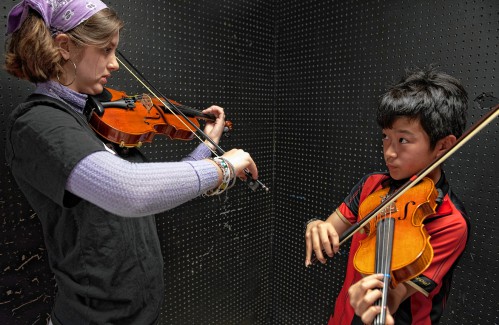
Sharing a few notes: High schoolers coaching younger string players one on one
AMHERST — Carefully holding and balancing his violin, 12-year-old Heedo Noh, a Fort River School sixth grader, gets a suggestion for positioning the bow so it runs straight across the strings as he practices G.F. Handel’s “Chorus from Judas...
Most Read
 ‘Home away from home’: North Amherst Library officially dedicated, as anonymous donor of $1.7M revealed
‘Home away from home’: North Amherst Library officially dedicated, as anonymous donor of $1.7M revealed
 ‘We can just be who we are’: Thousands show support for LGBTQ community at Hampshire Pride
‘We can just be who we are’: Thousands show support for LGBTQ community at Hampshire Pride
 South Hadley man killed in I-91 crash
South Hadley man killed in I-91 crash
 Retired superintendent to lead Hampshire Regional Schools on interim basis while search for permanent boss continues
Retired superintendent to lead Hampshire Regional Schools on interim basis while search for permanent boss continues
 A Waterfront revival: Two years after buying closed tavern, Holyoke couple set to open new event venue
A Waterfront revival: Two years after buying closed tavern, Holyoke couple set to open new event venue
 Proposed Hatfield pickleball/tennis building raising eyebrows
Proposed Hatfield pickleball/tennis building raising eyebrows
Editors Picks
 A Look Back: May 7
A Look Back: May 7
 Guest columnist Cathy McNally: Northampton School Committee standing up for children
Guest columnist Cathy McNally: Northampton School Committee standing up for children
 Karen Gardner: We all deserve a break
Karen Gardner: We all deserve a break
 The Beat Goes On: A trombone celebration in Holyoke, Lord Russ shifts gears, and the Hampshire Young People’s Chorus turns 25
The Beat Goes On: A trombone celebration in Holyoke, Lord Russ shifts gears, and the Hampshire Young People’s Chorus turns 25
Sports

Boys volleyball: Carey twins help power Frontier past Belchertown in straight sets (PHOTOS)
BELCHERTOWN — Throughout the entire offseason, Frontier senior Aleks Carey worked tirelessly to improve as a middle hitter so he could come back and dominate his position.When the season started, it became evident Carey was one of the best passers on...
 Swayman stops 38 shots, Bruins roll past Panthers 5-1 for 1-0 series lead
Swayman stops 38 shots, Bruins roll past Panthers 5-1 for 1-0 series lead
Opinion

Guest column: Serving educational needs shouldn’t be ‘aspirational’
The School Committee recently passed a level services budget requiring an increase in its share of the city’s budget. My colleagues and I voted 8-1 — with the mayor abstaining — to pass this budget. We did so because we understand the challenges...
 My Turn: Gaza and lies
My Turn: Gaza and lies
 Guest columnist Mariel E. Addis: Pride and prejudice
Guest columnist Mariel E. Addis: Pride and prejudice
 Guest columnist Gene Stamell: We know what we know
Guest columnist Gene Stamell: We know what we know
 Jennifer Dieringer: Budget must serve whole city
Jennifer Dieringer: Budget must serve whole city

Business

Area property deed transfers, May 2
AMHERST Faheem Ibrahim Lt and Faheem Ibrahim to Nan Zhao and Zhihong Ni, 16 Arbor Way, $738,000 Richard B. Spurgin to Yg Pleasant LLC, East Pleasant Street, Lot 1, $218,000 Richard B. Spurgin to Yg Pleasant LLC, East Pleasant Street, Lot 2,...
Arts & Life

Speaking of Nature: Capturing my Bermuda nemesis: The Great Kiskadee nearly evaded me, until I followed its song
We’ve reached that point in the school year when it is actually painful (I mean physically painful) for me to leave my yard in the morning. May is the true month of the reawakening and blooming of Nature’s splendor and last week she was in full...
Obituaries
 Eli Knapp Abrams
Eli Knapp Abrams
Florence, MA - Eli Knapp Abrams, of Florence Massachusetts, passed away suddenly on Monday, April 22nd, 2024 in Goshen, MA. Eli was born in Beverly, MA on March 19th, 2003. He is the cherished son of Jennifer and Maury Abrams, and belov... remainder of obit for Eli Knapp Abrams
 Sandy A. Bell
Sandy A. Bell
Easthampton, MA - Sandra A. Bell, 77, of Easthampton passed away peacefully on May 2, 2024 at Cooley Dickinson Hospital after a brief illness surrounded by her family. Sandy was born October 28, 1946, in Fall River, MA to John and V... remainder of obit for Sandy A. Bell
 Harold Portner
Harold Portner
Amherst, MA - It is with great sadness that we announce the passing of Harold (Hal) Portner, 93, of Amherst, MA on April 29, 2024. Hal was born in Hartford, CT on Dec. 5, 1930. Hal is predeceased by his parents Abraham and Leah (Specto... remainder of obit for Harold Portner
 Juanita Canty
Juanita Canty
Hadley , MA - Juanita a proud Cuban and Sagittarian self-taught antiques dealer beloved wife of over 40 years mother, grandmother, great grandmother and to all a loyal and generous friend. She completed her earthly journey on April 26, ... remainder of obit for Juanita Canty

 Easthampton to use built-up reserves to help cover $57.1M budget next year
Easthampton to use built-up reserves to help cover $57.1M budget next year
 Town manager’s plan shorts Amherst Regional Schools’ budget
Town manager’s plan shorts Amherst Regional Schools’ budget
 Fuller fends off challenge, wins 10th term on Chesterfield Select Board
Fuller fends off challenge, wins 10th term on Chesterfield Select Board
 School assessment, electricity program among items on Pelham Town Meeting docket
School assessment, electricity program among items on Pelham Town Meeting docket
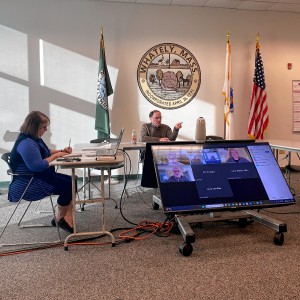 Easthampton native named Whately town administrator
Easthampton native named Whately town administrator
 Public gets a look at progress on Northampton Resilience Hub
Public gets a look at progress on Northampton Resilience Hub
 Police respond to alcohol-fueled incidents in Amherst
Police respond to alcohol-fueled incidents in Amherst
 Former Easthampton firefighter to serve 8 months for filming colleagues in women’s locker room
Former Easthampton firefighter to serve 8 months for filming colleagues in women’s locker room
 Bringing the Haitian vibe: Haitian Multicultural Day at Hopkins features Boston dance troupe
Bringing the Haitian vibe: Haitian Multicultural Day at Hopkins features Boston dance troupe
 Baseball: Smith Academy edged by Logan Moore, Mohawk Trail in 1-0 loss (PHOTOS)
Baseball: Smith Academy edged by Logan Moore, Mohawk Trail in 1-0 loss (PHOTOS)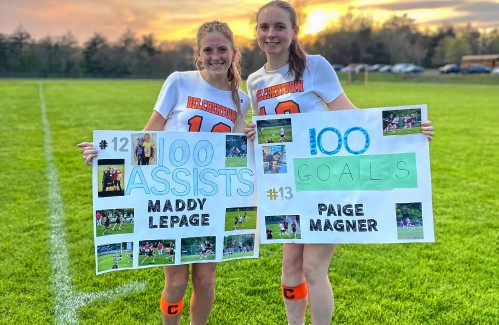 High schools: Belchertown lacrosse seniors Paige Magner and Maddy LePage celebrate milestones
High schools: Belchertown lacrosse seniors Paige Magner and Maddy LePage celebrate milestones Track & field: Northampton, Amherst split final dual meets of the season (PHOTOS)
Track & field: Northampton, Amherst split final dual meets of the season (PHOTOS)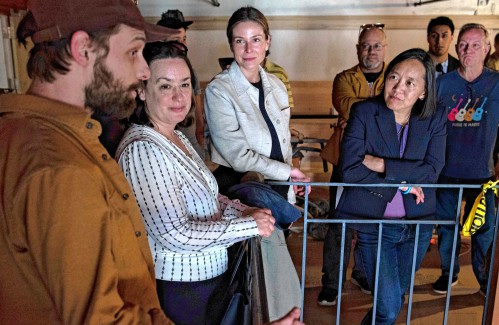 Music key to Northampton’s downtown revival: State’s top economic development leader tours city
Music key to Northampton’s downtown revival: State’s top economic development leader tours city  Locking up carbon for good: Easthampton inventor’s CO2 removal system turns biomass into biochar
Locking up carbon for good: Easthampton inventor’s CO2 removal system turns biomass into biochar Advancing water treatment: UMass startup Elateq Inc. wins state grant to deploy new technology
Advancing water treatment: UMass startup Elateq Inc. wins state grant to deploy new technology New Realtor Association CEO looks to work collaboratively to maximize housing options
New Realtor Association CEO looks to work collaboratively to maximize housing options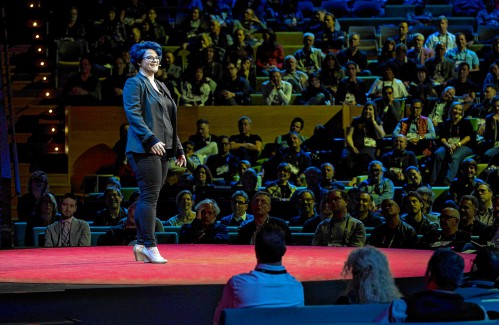 Easthampton author Emily Nagoski has done the research: It’s OK to love your body
Easthampton author Emily Nagoski has done the research: It’s OK to love your body Earth Matters: Honoring a local hero: After 40 years, Hitchcock Center bids farewell to educator and creative leader, Colleen Kelley
Earth Matters: Honoring a local hero: After 40 years, Hitchcock Center bids farewell to educator and creative leader, Colleen Kelley Valley Bounty: Delivering local food onto students’ plates: Marty’s Local connects farms to businesses
Valley Bounty: Delivering local food onto students’ plates: Marty’s Local connects farms to businesses Let’s Talk Relationships: Breaking up is hard to do: These tools can help it feel easier
Let’s Talk Relationships: Breaking up is hard to do: These tools can help it feel easier
